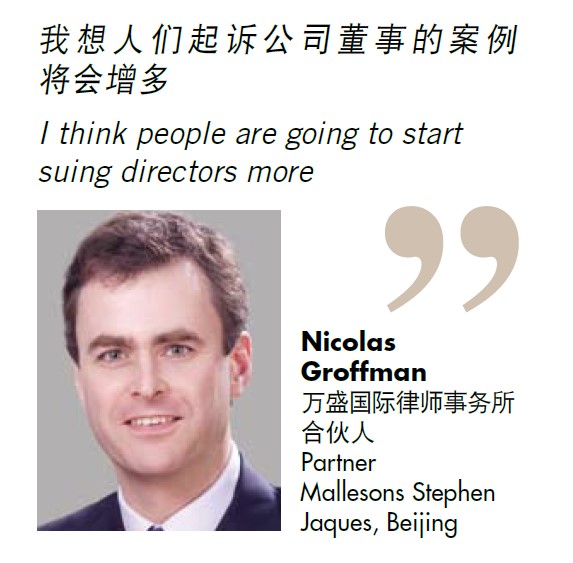The new PRC Tort Law includes many provisions that were already in other laws. But its very existence increases the likelihood of companies, and their directors, being sued. By Robin Weir
The new PRC Tort Law came into effect on 1 July. Newspapers predicted a surge in claims, with Chinese people taking to the courts to pursue grievances ranging from loss of a limb to breach of privacy. But rather than being entirely new, the law brings together many provisions and principles that were previously scattered among various laws, regulations and court opinions. This suggests that its immediate effect might be less radical than the newspaper headlines would have us believe.
There are, of course, several areas of the law that are new, or at least interesting. The law uses the term “punitive damages” for the first time in Chinese law, in the product liability chapter, which should ring alarm bells for any company manufacturing products that are sold within China. It specifies the right to privacy at national law level for the first time, although this is not defined in any detail. It outlines the right of an injured person to take action against an employer whose employees cause the damage in the course of their work. And it establishes strict liability for environmental damage, switching the burden of proof to the defendant. (Please see China Business Law Journal volume 1 issue 2, Tort law to take effect in July, and Tort law now in force)
But what will this all mean in practice, and what measures have domestic and foreign companies put in place to minimize the risk to them from litigation under the Tort Law?
Key provisions of the PRC Tort Law
Article 2 of the law contains a list of civil rights and interests that are to be protected. These include the right to privacy, as well as rights to life, health, reputation and property, and other fundamental things. However, the law contains no further detail on the right to privacy, except in relation to records kept by the medical profession (articles 61 and 62).
Article 15 outlines the principal remedies that are available against a tortfeasor. These include, among other things, requiring the tortfeasor to cease infringement, removing risks and obstacles created by the tortfeasor’s conduct, apologizing, and restoring the state of affairs that existed before commission of the tort.
Article 16 outlines the damages to which an injured party is entitled for bodily injuries.
Article 22 establishes the right of an injured party to proceed against a tortfeasor for serious mental distress.
Article 34 establishes the right of an injured party to proceed against an employer whose employees cause damage in the course of their work.
Article 36 establishes that internet service providers that infringe upon an individual’s civil rights via the internet are liable for a tort.
Chapter 5 of the law deals with defective products. Where a product that is already in circulation is found to be defective, the manufacturer and vendors shall take timely remedial measures such as (among other things) issuing warnings or recalling the product concerned. Manufacturers and vendors that knowingly produce or sell defective products which cause death or a serious health hazard are liable to pay punitive damages, without a specified limit (articles 46 and 47).
Article 68 imposes strict liability for environmental pollution even where such pollution has been caused by a third party.
Product liability is uppermost in corporate counsel’s minds. But the general counsel of an international drinks company in China notes that “punitive damages”, in the product liability section, can only be awarded in cases of bad faith, i.e. where a company knowingly produced the defective goods. “Therefore, it shall not be a concern for us,” he said. And Erica Wang, general counsel at Eli Lilly in Shanghai, believes that the pharmaceutical company’s existing obligations to the US Food and Drug Administration mean that the company already conducts sufficient employee training on the need to report “adverse events” relating to a marketed product, or product quality complaints. Little will change, it seems, at Eli Lilly as a result of the coming into effect of the PRC Tort Law.
Likewise, says Wang, Eli Lilly adheres to strict privacy standards, and requires its vendors to do the same. The company is, she says, “very comfortable” with the privacy provisions of the Tort Law.
An employer’s liability for the actions of its employees is also “nothing new”, but was a well-established concept under the PRC Civil Code, according to a number of in-house counsel.
And the reversal of the burden of proof in cases of environmental pollution is also nothing new, according to Nicolas Groffman, a partner at Mallesons Stephen Jaques in Beijing, having existed for over 10 years in implementing regulations to the PRC Civil Procedure Law.
Groffman reiterates that much of the new law already existed. “The principles were nearly all here already, but they just hadn’t been put into one big fat law,” he says. But he believes that the publicity surrounding the new law will in itself have an impact. “I think people are going to start suing company directors more. The liability of directors is in the tort law. Of course, it was already in Chinese law. But it was buried in boring laws like the Company Law, which ordinary people on the street are not going to read. Now everyone is going to know that the directors, legal representatives and general managers of companies – anyone who is responsible for something that happens – is fair game for a lawsuit”.






















